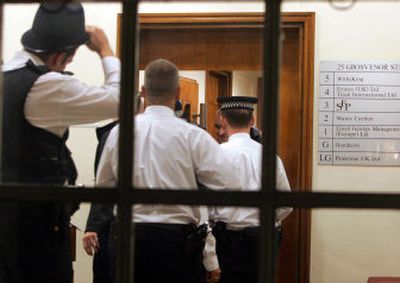Inquest under way in ex-spy’s death

LONDON – The British government began tracking radioactive hotspots in London on Monday to trace the poison that killed a former KGB agent, and three people who reported possible symptoms of contamination underwent testing.
Britain announced a formal inquest into the death of Alexander Litvinenko, but Home Secretary John Reid warned against rushing to conclusions over who might be responsible for the killing of the ex-spy turned Kremlin critic.
Litvinenko died Thursday after falling ill from what doctors said was poisoning by polonium-210, a radioactive isotope usually manufactured in specialized nuclear facilities. High doses of polonium, which is deadly if ingested or inhaled, were found in Litvinenko’s body.
“The nature of this radiation is such that it does not travel over long distances, a few centimeters at most, and therefore there is no need for public alarm,” Reid said in a special address to the House of Commons.
Police were able to interview Litvinenko in the hospital before he died, and are retracing Litvinenko’s steps on the day he said he fell ill.
Six sites showed traces of radiation linked to the poisoning, including a bar in London’s Millennium Hotel, a branch of Itsu Sushi near Piccadilly Circus, Litvinenko’s house in North London and a section of the hospital where he was treated when he fell ill on Nov. 1.
Two other sites – an office block in London’s west end and an address in the posh neighborhood of Mayfair – also showed traces of radiation, Scotland Yard said.
All the locations except Litvinenko’s home are in west London, separated by about a mile.
“They said there was only a trace,” said Alan Humberstone, a 27-year-old computer technician who said police found radiation at his office building in Mayfair. “(Police) said, ‘You would have to ingest something to be at risk.’ “
The Mayfair building near the Millennium Hotel contains a business intelligence company, Titon International Ltd., whose CEO was a former U.K. Special Services director, and Erinys UK Ltd., an international security and risk management company.
Erinys confirmed that Litvinenko had visited the office “on a matter totally unrelated to issues now being investigated by the police,” but declined to elaborate. None of the staff who had contact with him have reported any ill effects, the statement said.
The other location reportedly houses an office of Boris Berezovsky, the self-exiled tycoon and Kremlin critic wanted in Russia on money-laundering charges. Businesses listed at the address include a fund adviser, an investment firm, an energy company and offices of the newspaper publisher Metro International.
Berezovsky, who knew Litvinenko before both came to Britain and reportedly paid for the ex-spy’s home in North London, said Monday he would make no comment until the investigation was over.
The sushi restaurant and part of the hospital have been closed for decontamination.
Of the hundreds of people who called a hotline, three exhibited symptoms that health officials thought should be examined, said Katherine Lewis of the Health Protection Agency. She said the tests would take about a week.
Derek Hill, an expert in radiological science at the University College London, said the public health risk was low.
Although an autopsy has not started yet because of concerns over radioactivity, an inquest into Litvinenko’s death could begin as early as Thursday, according to Matt Cornish, a spokesman for Camden Council. The local government body oversees the North London Coroner’s Court. The opening is a legal formality, and such inquests are almost always adjourned immediately, sometimes for months.
Coroner’s inquests in Britain are meant to determine the cause of death but they sometimes cast blame.
British officials have avoided pointing the finger at Moscow, but emergency talks continued Monday over the former spy’s death – an issue that could overshadow tough negotiations over energy issues and Russia’s cooperation on Iran’s nuclear ambitions.